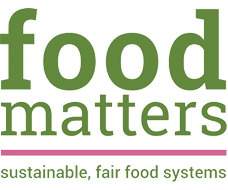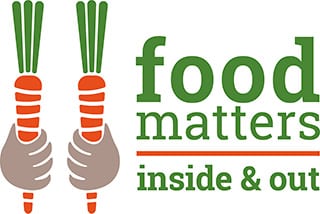Blog by Callum Etches, February 2024
For more than 10 years now, Food Matters has worked alongside Sustain and the Soil Association to deliver the Sustainable Food Places (SFP) programme, supporting a group of just 13 local food partnerships to grow into a prospering UK-wide network of over 90 members.
During this time, we have collected a huge amount of information on the work of food partnerships. Through surveys, consultations, interviews, reports, and research studies, we have amassed a wealth of data covering what partnerships have done, what innovations they have led and what impact they have had.
Rather than letting this information sit in a dusty folder, Food Matters set about making it accessible, enabling it to be shared, learnt from, and used to make-the-case for the value of local food partnerships. We un-mothballed a massive amount of stored data, organised, archived, and analysed it, and turned into the new SFP Evidence Database. Captured within this database are over 1200 case studies of partnership action, covering 33 areas of food systems impact.
To learn more about the Sustainable Food Places Evidence data base click here or watch this video:
What we unearthed during this process was a compelling story of systems wide impact, driven by a network of dedicated, highly skilled, and highly capable food partnership coordinators. To visualise this impact, Food Matters used this data to build the new SFP Impact Hub. This interactive tool maps food partnership impact across the food system, covering issues ranging from influencing food policy to transforming public procurement. Double click on the image below to start exploring the SFP Impact Hub or watch the How-To guide to learn more:
Food partnerships are having widespread impact across the whole food system and across all areas of the UK
The SFP Impact Hub shows the scope and scale of food partnership impact across food systems. By championing a whole system approach to food, they are interweaving issues such as food poverty, ill-health, agriculture, food security, and climate change to develop cross-sector solutions that are transforming food and farming. Food partnerships are now active in cities, boroughs and counties across England, Wales, Scotland, and Northern Ireland.
Food partnerships are working collaboratively with local authorities at all levels across the UK
The database records over 150 examples of food partnerships working collaboratively with local authorities at a city, borough and county level. The data shows how local authorities are increasingly co-producing food policy and strategy with their local food partnerships, who are valued for their cross-systems perspective and processes of community representation.
Food partnerships are playing an increasingly important role in building food security and systems resilience
The database records a huge amount of information on the role that food partnerships have played during both the COVID-19 pandemic and Cost-of-Living crisis. It shows the critical role that partnerships have played in coordinating food aid, addressing food poverty, and taking a long-term approach to building food security.
Food partnerships are helping to ensure communities are well represented within local food policy and action
Captured within the database are over 500 examples of food partnerships working to engage communities through events, communications, opportunities for learning and direct community engagement and consultation. The data shows how food partnerships put local communities are at the heart of their work, ensuring they are well represented within their governance structures.
Food partnership coordinators are underfunded and overstretched, but are doing extraordinary work
What the impact hub demonstrates above all else is the extraordinary work that food partnership coordinators are doing with often very little funded time. Food partnership coordinators drive forward the work of a partnership, convening and connecting local stakeholders, instigating local action and coordinating collective planning and strategy. If we want to see this impact continue, it is vitally important to ensure that food partnership coordinators can access secure long-term funding.
Interested in exploring how your organisation can make better use your own impact data? Reach out to [email protected] or check out our website //www.foodmatters.org/ to explore other services we can offer.
Blog by Callum Etches, February 2024
For more than 10 years now, Food Matters has worked alongside Sustain and the Soil Association to deliver the Sustainable Food Places (SFP) programme, supporting a group of just 13 local food partnerships to grow into a prospering UK-wide network of over 90 members.
During this time, we have collected a huge amount of information on the work of food partnerships. Through surveys, consultations, interviews, reports, and research studies, we have amassed a wealth of data covering what partnerships have done, what innovations they have led and what impact they have had.
Rather than letting this information sit in a dusty folder, Food Matters set about making it accessible, enabling it to be shared, learnt from, and used to make-the-case for the value of local food partnerships. We un-mothballed a massive amount of stored data, organised, archived, and analysed it, and turned into the new SFP Evidence Database. Captured within this database are over 1200 case studies of partnership action, covering 33 areas of food systems impact.
To learn more about the Sustainable Food Places Evidence data base click here or watch this video to learn more:
What we unearthed during this process was a compelling story of systems wide impact, driven by a network of dedicated, highly skilled, and highly capable food partnership coordinators. To visualise this impact, Food Matters used this data to build the new SFP Impact Hub. This interactive tool maps food partnership impact across the food system, covering issues ranging from influencing food policy to transforming public procurement. Double click on the image below to start exploring the SFP Impact Hub or watch the How-To guide to learn more:
Key findings from the SFP Impact Hub
While we have only just began the process of exploring this data, several key impact findings are already emerging:
Food partnerships are having widespread impact across the whole food system and across all areas of the UK
The SFP Impact Hub shows the scope and scale of food partnership impact across food systems. By championing a whole system approach to food, they are interweaving issues such as food poverty, ill-health, agriculture, food security, and climate change to develop cross-sector solutions that are transforming food and farming. Food partnerships are now active in cities, boroughs and counties across England, Wales, Scotland, and Northern Ireland.
Food partnerships are working collaboratively with local authorities at all levels across the UK
The database records over 150 examples of food partnerships working collaboratively with local authorities at a city, borough and county level. The data shows how local authorities are increasingly co-producing food policy and strategy with their local food partnerships, who are valued for their cross-systems perspective and processes of community representation.
Food partnerships are playing an increasingly important role in building food security and systems resilience
The database records a huge amount of information on the role that food partnerships have played during both the COVID-19 pandemic and Cost-of-Living crisis. It shows the critical role that partnerships have played in coordinating food aid, addressing food poverty, and taking a long-term approach to building food security.
Food partnerships are helping to ensure communities are well represented within local food policy and action
Captured within the database are over 500 examples of food partnerships working to engage communities through events, communications, opportunities for learning and direct community engagement and consultation. The data shows how food partnerships put local communities are at the heart of their work, ensuring they are well represented within their governance structures.
Food partnership coordinators are underfunded and overstretched, but are doing extraordinary work
What the impact hub demonstrates above all else is the extraordinary work that food partnership coordinators are doing with often very little funded time. Food partnership coordinators drive forward the work of a partnership, convening and connecting local stakeholders, instigating local action and coordinating collective planning and strategy. If we want to see this impact continue, it is vitally important to ensure that food partnership coordinators can access secure long-term funding.
Interested in exploring how your organisation can make better use your own impact data? Reach out to [email protected] or check out our website //www.foodmatters.org/ to explore other services we can offer.





